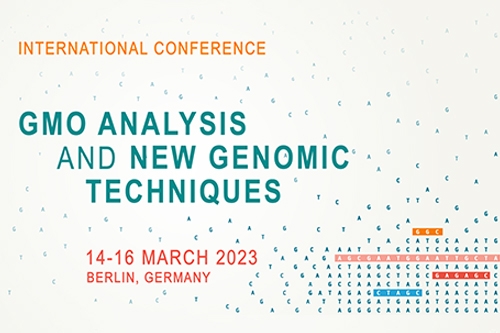14.03.2023: International Conference on GMO Analysis and New Genomic Techniques

International Conference on GMO Analysis and New Genomic Techniques
The state of the art of scientific and technical aspects of GMO analysis has significantly evolved during the last decade. This includes not only developments such as Next-Generation Sequencing (NGS) and digital PCR, but also challenges that derive from the application of New Genomic Techniques. In the spirit of the ‘1st Global Conference on GMO Analysis’ held in 2008 in Italy , these new trends and developments call for an update of scientific exchange within the international community of GMO detection.
In this context, we are pleased to announce the organisation of the ‘International Conference on GMO Analysis and New Genomic Techniques’ in March 2023.
The presentations and livestream recordings can be found further down on this website.
-
Details
The conference will promote broad technical and scientific exchange between scientists worldwide on the status and challenges for traceability, detection and identification of GMOs, with an emphasis on the fast evolving DNA-based detection methods.
The conference will also contribute to capacity building for experts and laboratories involved in the detection and identification of GMOs and serves as platform of networking among regions as well as at global level.
Sessions:Session 1 – Detection and identification of “classical” GMO and NGT products - Status and challenges
Session 2 – Detection of NGT products - Analytical methods
Session 3 – Requirements for the Identification of NGT products
Session 4 – Detection of “classical” GMOs - Analytical methods
Session 5 – Regional networks: experiences gained in various regions
Session 6 – Global information sharing
Session 7 – Alternative approaches for GMO traceability
Panel discussion – Future needs detection / identification / harmonisation / capacity building
You can find the detailed programme here.
Presentations from 14.03.2023
Guy Van den Eede, EC-JRC
Achievements and future perspectives of GMO detection
Malcolm Burns, LGC-Group, UK
Analytical strategies for detection of GMOs and NGT products - status and challengesAlexandra Ribarits, AGES, AT
Identification of known / unknown classical GMO and NGT products / reference materialsPresentations from 15.03.2023
Raymond Shillito, BASF, US
Analytical methods for the detection of NGT products
Margit Ross, Corteva Agriscience, US
NGT Products: Methods and Matters of Detection
Patrick Gürtler, LGL Oberschleißheim, DE
Evaluation of methods for the unequivocal identification of single-mutations derived from NGT
Sławomir Sowa, PBAI-NRI, PL
Challenges for the detection and identification of NGT products
Fabrice Touzain, ANSES, FR
Detection/characterisation of undescribed genetically modified bacteria by statistical analysis of high throughput sequencing dataPresentations from 16.03.2023
Christopher Viljoen, School of Biomedical Sciences Human Molecular, ZA
Lessons learnt from capacity building in LMO detection in the Southern African Network of GM detection Laboratories (SANGL)
Luu Minh Cuc, Institute of Agricultural Genetics, VN
Current status and challenges of GMOs development and GMO detection methods in Vietnam
Austein McLoughlin, SCBD, CA
The Network of Laboratories for the Detection and Identification of Living Modified Organisms
The Biosafety Clearing-House
Laura Bonfini, EC-JRC
JRC GMO web applications
Theo Prins, Wageningen Food Safety Research, NL
Global information sharing: EUginius
Sonia Herrero, Syngenta, US
Introduction to CropLife International detection methods database
Inácio Henrique Yano, Embrapa, BR
Prototype of Non-Genetically Modified Soybean Tracking System Using Blockchain Technology
Jenny Teufel, Institute for Applied Ecology, DE
Alternative approaches for GMO traceability -

